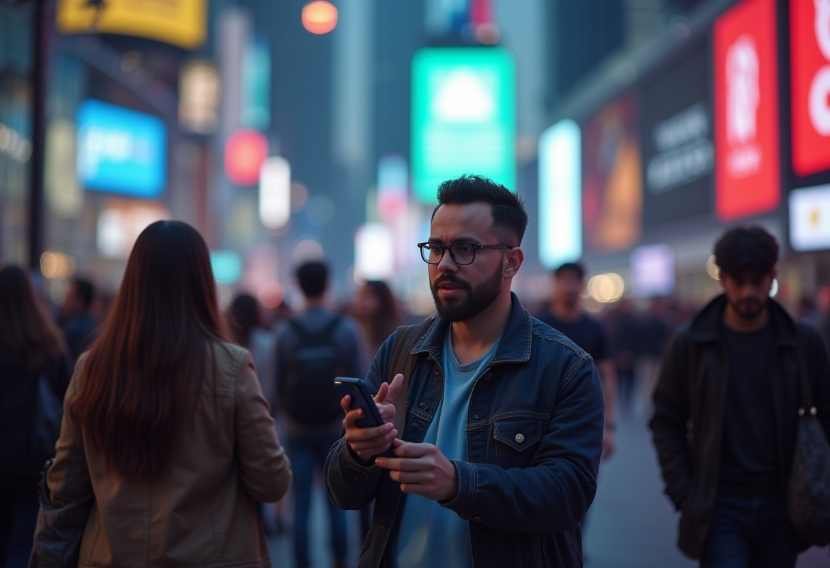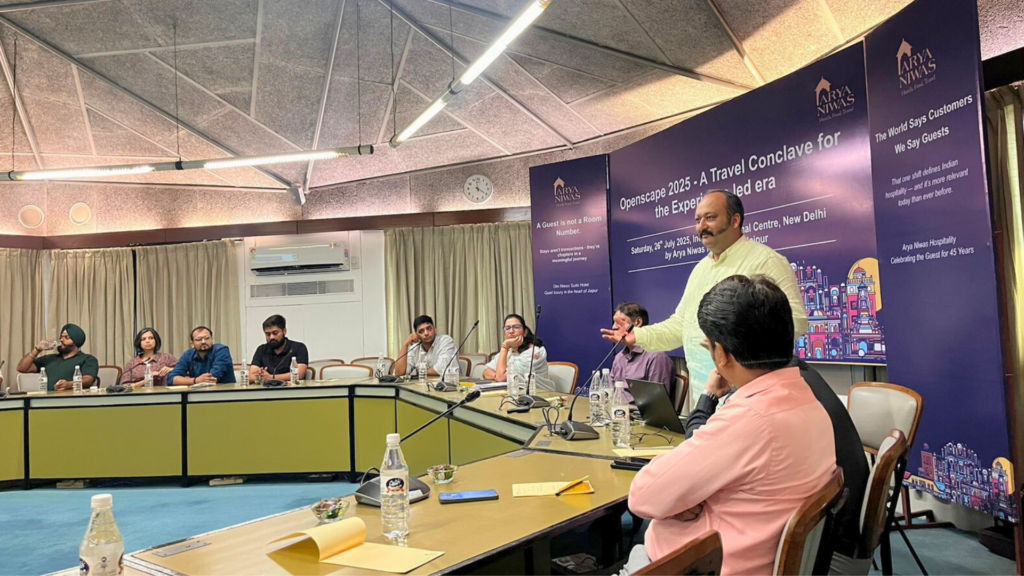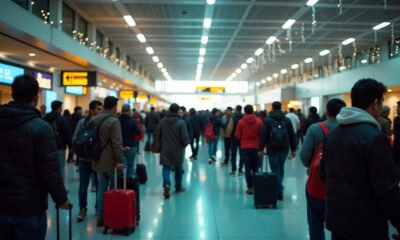AI in Travel
Malaysia, Singapore, And The US: Global Destinations Seeing Surge In AI Generated Travel Scam: What You Need To Know

Thursday, July 24, 2025
As technology revolutionizes all facets of our lives, the travel market is confronted with yet another and growing threat: AI-based fraud. A tragic case in Malaysia is a current case in point. In July, an AI video of a non-existent cable car in Kuak Hulu, Perak, led an elderly couple from Kuala Lumpur to the location, only for them to discover it was a scam. This episode, being shared on platforms like TikTok and Facebook, is evidence of the pernicious power that AI is capable of wielding over jetsetters.
The fake video’s high-quality graphics and fabricated news-style voiceover tricked consumers into thinking the cable car was real. But this was only the latest in a spate of artificial intelligence-based scams that had been sweeping across travel around the world, and bringing security and consumer protection in the travel industry under scrutiny and alarm.
The Growing Concern Over AI Fraud in the Travel Industry
The travel sector has an increasing struggle on its hands in battling against AI-based scams to protect personal data, with findings from a recent Jumio research revealing ISPs could take a share of the burden by adopting snart scanning technology. Nearly half of global consumers (44%) say they are resistant to protecting themselves from AI-powered fraud (ID theft and ATO (account takeover) scams) because they believe the travel industry will safeguard them. This is according to the 2025 Online Identity Study. This lack of confidence is due to increasingly sophisticated fraud strategies, including AI-generated fraud that can fool consumers and businesses alike.
Regional Differences in AI Fraud Concerns
Interestingly, the study highlights regional differences in the level of concern over AI fraud. Consumers in the United States exhibit the highest level of concern, with 55% of respondents indicating that they lack confidence in the travel industry’s ability to protect them from AI fraud. This concern is slightly less in the United Kingdom (22%) and Germany (30%), but still represents a significant portion of travelers worldwide.
In stark contrast, Singapore has the lowest level of concern about AI-driven fraud, with only 37% of consumers expressing a lack of confidence in security measures. However, this figure raises concerns that the rapid rise of AI fraud is being underestimated in one of Asia’s most significant travel hubs. Singapore, while a global leader in technology and digital security, could be at risk if consumers increasingly prioritize convenience over safety when booking travel services, as shown by the growing trend of decreased caution in verification.
Consumers are Willing to Invest in Digital Security
Despite rising fears of AI fraud, the study reveals that consumers are becoming more willing to invest time and effort into securing their personal data when planning travel. In 2025, 74% of global consumers said they would be willing to spend more time on identity verification when accessing travel and hospitality-related platforms, up from 71% in 2024. This trend reflects a growing desire to safeguard personal information while using digital travel services, such as booking flights, accommodations, and car rentals.
Interestingly, consumers in Singapore are the most willing to spend additional time on identity verification, with 78% expressing this preference. However, this figure represents a decline from the previous year, indicating that the increasing sophistication of AI scams may be causing some consumers to lower their guard in favor of convenience.
This trend is not isolated to travel; in industries such as banking and finance, consumers worldwide are also prioritizing security, with 80% of global respondents saying they are willing to spend more time on security for digital banking platforms.
The Role of AI in Shaping the Future of Travel Security
As AI continues to evolve, so do the tactics used by cybercriminals to target unsuspecting travelers. For example, AI-generated videos, deepfakes, and fabricated news reports are becoming more convincing, allowing fraudsters to manipulate travelers into taking actions they otherwise would not. The rise of these technologies in the travel industry calls for a more robust approach to digital security, one that balances convenience with protection.
The travel and hospitality industry must adopt new solutions that address these emerging threats. As Bala Kumar, Chief Product and Technology Officer at Jumio, explains, “Whether it’s an evacuation plan or a safe in every hotel room, the travel and hospitality industry knows how to build the structures and processes customers need to feel safe. Now customers expect the same level of care for their personal data.”
To meet these evolving security challenges, businesses within the travel sector will need to adopt advanced AI tools that can detect and prevent fraudulent activities. AI-powered security systems can help verify user identities, monitor transactions in real-time, and provide a more secure environment for consumers making online travel bookings.
Future Outlook: How Travel Companies Can Adapt to AI Fraud Risks
For the travel industry to protect itself and its customers from the rising tide of AI-powered fraud, several measures are critical:
Invest in Advanced Security Systems: The adoption of AI-based fraud detection systems that can track and flag suspicious activity in real-time is essential for the future of secure travel.
Focus on Consumer Education: Travel companies should educate consumers on the importance of verifying sources before making bookings, especially on social media platforms where AI-generated content is prevalent.
Enhance Identity Verification Processes: Streamlining and improving the effectiveness of identity verification processes can help prevent unauthorized access to personal information and financial data.
Collaboration Across the Industry: Governments, tech companies, and the travel industry must work together to create robust frameworks and guidelines that address emerging threats in AI and digital fraud.
Conclusion: The Future of Safe Travel in an AI-Driven World
AI-driven fraud is now an undeniable threat for the travel sector, both businesses and consumers. AI systems offer valuable opportunities for simplifying travel operations, but they also carry new risks that need to be controlled. As customers expect more for their security, the travel sector needs to change to keep up; developing a whole new range of new tech and ways to keep people safe while still making their journeys more efficient.
Travel providers can still flourish in the face of these developing digital threats by employing more secure platforms, educating their customers and leveraging new AI-driven solutions. Once the travel recovery is complete, that capability is going to be all the more critical to protecting travellers from AI-fuelled scams, and ensuring that people can safely and confidently visit the most interesting travel destinations across the world.
AI in Travel
With focus on AI, sustainable travel Arya Niwas organises Openscapes 2025 in New Delhi

The opportunities and challenges that issues like artificial intelligence, sustainability and experiential travel pose to the tourism industry in India and overseas were highlighted at Openscapes 2025, a travel conclave in New Delhi on Saturday.
Organised by Arya Niwas, a hospitality group based in Jaipur, the conclave served as a participative platform to explore transformative ideas for the tourism sector, addressing pressing issues such as sustainability, experiential curation, the role of artificial intelligence (AI), and the integration of responsible practices into the travel experience.
Drawing stakeholders from across India’s hospitality industry, the conclave was organised with the core theme of Projecting India and Rajasthan with a stronger, more meaningful narrative.
“This is the first conclave. It is called Openscapes. We hope that we will be having more such dialogue-based conclaves on travel. There is a need for us to behave as one in the travel industry and to move forward together because the ultimate aim is to serve the guests and make the guests win,” Pooja Bansal, Owner and General Manager, Arya Niwas, told India & You on the sidelines of the event.
The urgency of the issues raised at the meeting was underscored by leading tour operators, who highlighted that Indian tourism, particularly in recent years, “has not been sustainable and things have gone really, really bad.”
The conclave drew stakeholders from across India’s hospitality industry
“When we talk about sustainability with experiential tourism, the experience at the grassroot level, meeting local people with a bit of sustainability, offers eye-opening encounters. Yet, there are challenges,” Navneet Arora, Managing Director, VINString Holidays, a travel agency in New Delhi, told India & You.
The meeting illustrated both obstacles and achievements in rural and urban experiential tourism. Operators cited instances where visitors’ immersion in heritage neighbourhoods and private homes fostered mutual pride among locals and tourists. However, they also warned against approaches that leave rural residents feeling like “monkeys in the zoo,” underscoring the necessity of responsible, respectful interaction, something now addressed by ensuring a share of tour proceeds benefit the communities involved. Sustainability, participants argued, extends well beyond eco-friendly rhetoric.
The conclave highlighted innovative tour formats, slow tourism, creative workshops and direct engagement with artisans, as pathways for deeper, more rewarding guest experiences.
“I think that is the call for the future, because automation has to come in. If we are not doing automation today, we are backwards. AI is important. The event opens up eyes for a lot of people. Difficult, but yes, AI and sustainability are important and doable,” Arora added.
“The interpretation of sustainability has become very cliché. This was a session to break that,” said Bansal.
Participants at the Openscapes 2025 called for a sustained dialogue, with suggestions for sector-wide conventions and targetted sessions on marketing and AI and more collaborative initiatives.
AI in Travel
Sabre Corporation’s Strategic Partnership with Christopherson Business Travel and Its Implications for Undervalued Cloud and AI Stocks

Sabre Corporation (NASDAQ: SABR) has long been a cornerstone of the global travel technology sector, but its recent strategic partnership with Christopherson Business Travel marks a pivotal evolution. By leveraging its AI-driven platform and cloud-native infrastructure, Sabre is not only modernizing corporate travel management but also positioning itself as a catalyst for growth in the undervalued travel tech sector. For investors, this collaboration offers a compelling case study in how AI and cloud innovation can unlock long-term value in a niche yet resilient market.
A Strategic Alliance for the Future of Corporate Travel
On July 17, 2025, Sabre announced a multi-year agreement to become Christopherson Business Travel’s primary technology partner. This partnership is more than a transactional arrangement—it’s a strategic alignment of two companies aiming to redefine corporate travel through automation, real-time data, and personalized service. Sabre’s AI-powered tools, including Sabre Red 360, Trip Proposal, and Market Intelligence, will streamline operations for Christopherson, enabling faster decision-making and enhanced client offerings.
The integration of Sabre’s cloud-native infrastructure into Christopherson’s proprietary Andavo platform is particularly noteworthy. This move allows for real-time orchestration of multi-source content (air, hotel, rail, ground) and seamless API-driven integrations, reducing manual effort and improving scalability. As Chad Maughan, CTO of Christopherson, noted, Sabre’s architecture provides the operational flexibility needed to adapt to evolving client demands—a critical advantage in the post-pandemic corporate travel landscape.
Sabre’s Financial Resilience and AI-Driven Growth
Sabre’s financial performance in 2024 underscores its transition from a turnaround story to a growth-oriented entity. Revenue increased to $3 billion, with adjusted EBITDA rising to $517 million—a 54% year-over-year improvement. While IT Solutions revenue dipped due to de-migrations, the Travel Solutions and Distribution segments grew by 4% and 6%, respectively, driven by demand for Sabre’s AI-powered tools.
The company’s market cap of $1.222 billion pales in comparison to AI/cloud giants like Databricks ($62 billion) or Snowflake ($43.6 billion), but this undervaluation reflects Sabre’s niche focus. Its strategic investments in Sabre Mosaic—a modular platform combining AI, cloud, and traditional agent workflows—position it to capture a larger share of the corporate travel market, which is projected to grow as businesses prioritize cost optimization and efficiency.
The AI/Cloud Travel Tech Opportunity
The broader travel tech sector is undergoing a transformation fueled by generative AI. According to Skift Research, AI-driven tools could create a $28 billion+ opportunity for the industry, with applications in personalized itineraries, dynamic pricing, and automated customer service. Sabre’s Automated Exchanges & Refunds and Agency Retailer solutions are already streamlining post-booking processes, reducing manual intervention by up to 70%.
However, Sabre is not alone in the race to monetize AI in travel. Competitors like C3.ai (NYSE: AI), Marvell Technology (NASDAQ: MRVL), and DigitalOcean (DOCN) are also leveraging cloud and AI to drive growth. C3.ai’s predictive analytics tools, for instance, have secured government contracts worth $450 million, while Marvell’s AI-optimized chips are powering data centers for hyperscale providers. Yet, Sabre’s deep vertical integration into travel-specific workflows gives it a unique edge in the corporate travel niche.
Why Sabre Is an Undervalued Investment
Despite its strategic advantages, Sabre remains overlooked by many investors. Its current price-to-earnings ratio (P/E) of 8.5 is significantly lower than the industry average of 18.5, and its hedge fund ownership (11.2%) suggests growing confidence in its AI-driven roadmap. The partnership with Christopherson is a validation of Sabre’s value proposition: it enables the company to scale its AI/Cloud offerings without overhauling existing systems, a critical factor for travel agencies seeking cost-effective modernization.
For investors, the key question is whether Sabre can replicate its success in other verticals. The company’s PowerSuite Cloud platform, which automates operations and integrates NDC content, is already gaining traction among mid-sized travel agencies. If Sabre can expand its footprint in the corporate and leisure travel markets, its revenue could outpace the 10% growth projected by analysts.
Conclusion: A Strategic Bet on AI-Driven Travel
Sabre’s partnership with Christopherson Business Travel is a microcosm of the broader shift toward AI and cloud-native solutions in travel technology. While the company may lack the valuation of tech giants like Microsoft or Google, its focus on vertical-specific innovation and operational efficiency makes it a compelling play for investors seeking exposure to the travel sector’s AI revolution.
For those considering a diversified portfolio, Sabre offers a unique blend of undervaluation and growth potential. However, it should be viewed as a complementary holding to broader AI/cloud stocks like C3.ai or Marvell, rather than a standalone bet. As the travel industry continues to embrace AI-driven automation, Sabre’s ability to deliver scalable, client-centric solutions will likely drive long-term value for both its partners and shareholders.
AI in Travel
AI Travel Tricks: Watch Out for the Road to Nowhere – Herald/Review Media

AI Travel Tricks: Watch Out for the Road to Nowhere Herald/Review Media
Source link
-

 Brand Stories6 days ago
Brand Stories6 days agoBloom Hotels: A Modern Vision of Hospitality Redefining Travel
-

 Brand Stories1 day ago
Brand Stories1 day agoCheQin.ai sets a new standard for hotel booking with its AI capabilities: empowering travellers to bargain, choose the best, and book with clarity.
-

 Destinations & Things To Do7 days ago
Destinations & Things To Do7 days agoUntouched Destinations: Stunning Hidden Gems You Must Visit
-

 AI in Travel7 days ago
AI in Travel7 days agoAI Travel Revolution: Must-Have Guide to the Best Experience
-

 Brand Stories3 weeks ago
Brand Stories3 weeks agoVoice AI Startup ElevenLabs Plans to Add Hubs Around the World
-

 Brand Stories2 weeks ago
Brand Stories2 weeks agoHow Elon Musk’s rogue Grok chatbot became a cautionary AI tale
-

 Destinations & Things To Do1 day ago
Destinations & Things To Do1 day agoThis Hidden Beach in India Glows at Night-But Only in One Secret Season
-

 Asia Travel Pulse3 weeks ago
Asia Travel Pulse3 weeks agoLooking For Adventure In Asia? Here Are 7 Epic Destinations You Need To Experience At Least Once – Zee News
-

 AI in Travel3 weeks ago
AI in Travel3 weeks ago‘Will AI take my job?’ A trip to a Beijing fortune-telling bar to see what lies ahead | China
-

 Brand Stories3 weeks ago
Brand Stories3 weeks agoChatGPT — the last of the great romantics













You must be logged in to post a comment Login